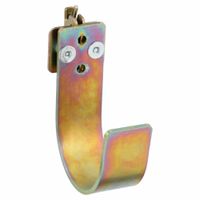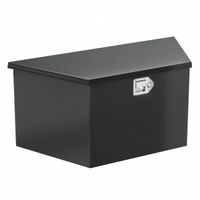Call +(254) 703 030 000 / 751 483 999 / 721 704 777
- Home
- Fleet Vehicle Maintenance
- Vehicle Accessories
- Vehicle Storage
- Trailer Storage
Trailer Storage
Trailer storage items connect to a trailer hitch or mount within a towed trailer. Trailer tongue boxes fit in the space where the trailer attaches to the hitch of the towing vehicle. Trailer storage accessories provide additional storage options for tools and gear on trailers. Read Less
Frequently Asked Questions
What are the best trailer tongue boxes for storage?
1. **Dee Zee DZ91717P Poly Triangle Trailer Box**: Known for its durability and lightweight design, this box is made from a rigid poly plastic that resists warping and denting. It features a double-walled lid for extra security and a molded cup holder on top.
2. **MaxxHaul 50218 Aluminum A-Frame Trailer Tongue Box**: This box is constructed from corrosion-resistant aluminum with a diamond plate pattern. It offers a secure locking mechanism and a weather-resistant seal to protect contents from the elements.
3. **Buyers Products 1701680 Black Steel Trailer Tongue Box**: Made from heavy-duty steel, this box is powder-coated for rust resistance. It includes a secure locking system and a weather-resistant gasket to keep contents dry.
4. **ARKSEN 30 Inch Aluminum Diamond Plate Tool Box**: This box is crafted from durable aluminum with a diamond plate finish. It features a weather-resistant seal and a lockable paddle latch for security.
5. **UWS TBS-63-A-LP Low Profile Trailer Box**: Known for its low-profile design, this box is made from extra-thick aluminum with a patented RigidCore lid. It offers a MicroSeal gasket to keep out moisture and dust.
6. **Tractor Supply 35" Aluminum Trailer Tongue Box**: This box is made from rust-resistant aluminum with a diamond tread pattern. It includes a weather-resistant seal and a lockable latch for added security.
7. **Better Built 66212326 ATV Tool Box**: Designed for versatility, this box is made from durable aluminum and features a locking paddle handle. It is weather-resistant and offers ample storage space.
8. **Lund 76150 16-Gauge Steel Trailer Tongue Box**: Constructed from heavy-duty steel, this box is designed for maximum durability. It features a weatherproof seal and a secure locking system.
How do I install a trailer tongue box?
1. **Select the Box**: Choose a trailer tongue box that fits your trailer's dimensions and meets your storage needs.
2. **Gather Tools and Materials**: You’ll need a drill, drill bits, wrenches, bolts, nuts, washers, measuring tape, and a marker.
3. **Position the Box**: Place the box on the trailer tongue to determine the best position. Ensure it doesn’t interfere with the trailer’s operation or hitching.
4. **Mark the Drill Holes**: Use a marker to outline the mounting holes on the trailer tongue through the pre-drilled holes in the box.
5. **Drill Holes**: Remove the box and drill holes at the marked spots on the trailer tongue. Use a drill bit that matches the size of your bolts.
6. **Align the Box**: Place the box back on the trailer tongue, aligning it with the drilled holes.
7. **Insert Bolts**: Insert bolts through the box and trailer tongue. Use washers to distribute pressure and prevent damage.
8. **Secure with Nuts**: Tighten nuts onto the bolts from underneath the trailer tongue. Use a wrench to ensure they are secure.
9. **Check Stability**: Ensure the box is firmly attached and doesn’t move. Tighten bolts if necessary.
10. **Test Functionality**: Open and close the box to ensure it operates smoothly and doesn’t interfere with the trailer’s function.
11. **Seal Edges (Optional)**: Apply a sealant around the edges of the box to prevent water ingress.
12. **Final Inspection**: Double-check all connections and ensure the box is secure and functional before using the trailer.
What materials are trailer tongue boxes made from?
Trailer tongue boxes are typically made from the following materials:
1. **Aluminum**: Lightweight and resistant to rust and corrosion, aluminum is a popular choice for trailer tongue boxes. It is durable and often features a diamond plate pattern for added strength and aesthetic appeal.
2. **Steel**: Known for its strength and durability, steel is another common material used for trailer tongue boxes. It is often coated with a powder finish to prevent rust and corrosion, making it suitable for heavy-duty applications.
3. **Plastic**: High-density polyethylene (HDPE) or other durable plastics are used for lightweight and cost-effective trailer tongue boxes. These materials are resistant to weather and chemicals, making them a practical choice for various environments.
4. **Stainless Steel**: Offering superior corrosion resistance, stainless steel is used for high-end trailer tongue boxes. It is strong and durable, though typically heavier and more expensive than other materials.
5. **Composite Materials**: Some trailer tongue boxes are made from composite materials, which combine different substances to enhance strength, durability, and resistance to environmental factors. These materials can offer a balance between weight and durability.
Each material has its own advantages and is chosen based on factors like weight, durability, cost, and resistance to environmental conditions.
How do I secure a trailer tongue box to prevent theft?
To secure a trailer tongue box and prevent theft, follow these steps:
1. **Choose a Secure Box**: Opt for a tongue box made of heavy-duty materials like steel or aluminum with reinforced corners and a robust locking mechanism.
2. **Use High-Quality Locks**: Replace standard locks with high-security options such as puck locks or disc locks, which are more resistant to cutting and picking.
3. **Install a Locking Hitch Pin**: Use a locking hitch pin to secure the trailer to the vehicle, preventing thieves from easily detaching the trailer.
4. **Anchor the Box**: Bolt the tongue box directly to the trailer frame using carriage bolts, which are harder to remove from the outside. Use lock nuts or thread-locking adhesive to prevent loosening.
5. **Add a Security Cable or Chain**: Wrap a heavy-duty security cable or chain through the box handles and around the trailer frame, securing it with a high-quality padlock.
6. **Use a Trailer Coupler Lock**: Install a coupler lock on the trailer hitch to prevent it from being attached to another vehicle.
7. **Install a Wheel Lock**: Use a wheel lock or boot on the trailer's wheels to prevent it from being moved.
8. **Park Strategically**: Park the trailer in a well-lit, visible area, preferably with surveillance cameras. Position it so the tongue box is less accessible, such as against a wall or another vehicle.
9. **Use GPS Tracking**: Install a GPS tracking device inside the box to locate it if stolen.
10. **Regularly Check and Maintain**: Regularly inspect all security measures to ensure they are intact and functioning properly. Replace any worn or damaged components immediately.
What size trailer tongue box do I need for my trailer?
To determine the appropriate size for a trailer tongue box, consider the following factors:
1. **Purpose and Contents**: Identify what you plan to store in the box. Common items include tools, straps, jacks, and other equipment. The size of these items will dictate the minimum dimensions required.
2. **Trailer Size and Design**: Measure the available space on the trailer tongue. Ensure the box fits without obstructing the trailer's operation or turning radius. Consider the shape and design of the trailer tongue, as some are A-frame while others are straight.
3. **Weight Capacity**: Check the trailer's tongue weight capacity to ensure it can support the additional weight of the box and its contents. Overloading the tongue can affect towing stability.
4. **Material and Durability**: Choose a box made from durable materials like aluminum, steel, or heavy-duty plastic. The material can affect the weight and size options available.
5. **Security and Accessibility**: Consider a box with a secure locking mechanism to protect your items. Ensure it is easily accessible and that the lid opens fully without obstruction.
6. **Weather Resistance**: If you plan to store items sensitive to weather, opt for a box with weatherproofing features like rubber seals and rust-resistant materials.
7. **Budget**: Larger and more durable boxes tend to be more expensive. Balance your needs with your budget.
By evaluating these factors, you can select a trailer tongue box that fits your specific requirements, ensuring it is both functional and compatible with your trailer.
Can I use a trailer tongue box for storing tools and equipment?
Yes, you can use a trailer tongue box for storing tools and equipment. Trailer tongue boxes are designed to fit on the A-frame of a trailer, providing additional storage space without taking up room inside the trailer itself. They are typically made from durable materials like aluminum, steel, or heavy-duty plastic, which offer protection against weather elements and potential theft.
When using a trailer tongue box for tools and equipment, consider the following:
1. **Size and Capacity**: Ensure the box is large enough to accommodate your tools and equipment. Check the weight capacity to avoid overloading, which could affect the trailer's balance and handling.
2. **Material and Durability**: Choose a box made from a material that suits your needs. Aluminum is lightweight and resistant to rust, while steel offers more strength but can be heavier. Plastic is lightweight and resistant to corrosion but may not be as durable as metal options.
3. **Security Features**: Look for boxes with secure locking mechanisms to protect your tools from theft. Some boxes come with reinforced locks or the ability to add padlocks for extra security.
4. **Weather Resistance**: Ensure the box is weatherproof to protect your tools from rain, snow, and dust. Look for features like rubber gaskets and sealed seams.
5. **Organization**: Consider boxes with built-in compartments or the ability to add dividers, which can help keep your tools organized and easily accessible.
6. **Installation**: Ensure the box is compatible with your trailer's design and can be securely mounted. Proper installation is crucial to prevent the box from shifting or detaching during transit.
By considering these factors, a trailer tongue box can be an effective and convenient solution for storing tools and equipment.
Are trailer tongue boxes waterproof and weather-resistant?
Trailer tongue boxes are generally designed to be weather-resistant, but not all are completely waterproof. Weather-resistant means they can withstand exposure to elements like rain, snow, and UV rays to a certain extent, protecting the contents from moisture and environmental damage. However, the level of protection varies based on the materials used and the construction quality.
Most trailer tongue boxes are made from materials like aluminum, steel, or heavy-duty plastic, which offer varying degrees of resistance to weather conditions. Aluminum and steel boxes often have a powder-coated finish to prevent rust and corrosion, while plastic boxes are inherently resistant to rust.
The design features of a trailer tongue box also contribute to its weather resistance. Many boxes come with rubber gaskets or seals around the lid to prevent water ingress. The lid design, such as overlapping edges, can further enhance protection against rain and splashes. However, these features do not guarantee complete waterproofing, especially in extreme conditions or prolonged exposure to water.
For those requiring higher levels of waterproofing, additional measures can be taken, such as applying sealants or using waterproof liners inside the box. It's important to check the manufacturer's specifications and user reviews to understand the level of water resistance offered by a specific model.
In summary, while trailer tongue boxes are typically weather-resistant, they may not be fully waterproof. Users should consider the materials, design features, and additional protective measures to ensure adequate protection for their specific needs.

